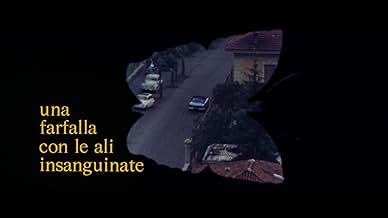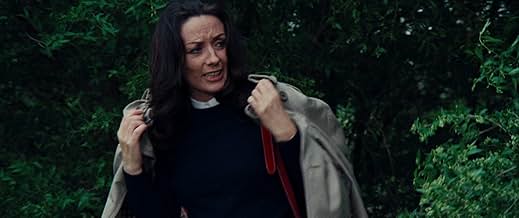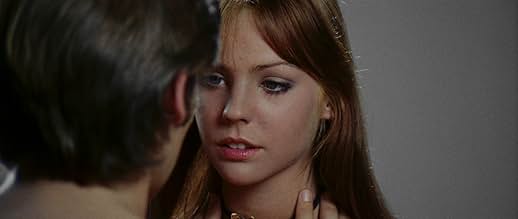Un papillon aux ailes ensanglantées
Original title: Una farfalla con le ali insanguinate
IMDb RATING
6.3/10
2.2K
YOUR RATING
A popular television presenter is accused of killing a teenage girl in a park, who happens to be his daughter's best friend.A popular television presenter is accused of killing a teenage girl in a park, who happens to be his daughter's best friend.A popular television presenter is accused of killing a teenage girl in a park, who happens to be his daughter's best friend.
Ida Galli
- Maria Marchi
- (as Evelyn Stewart)
Wendy D'Olive
- Sarah Marchi
- (as Wendi D'Olive)
Gabriella D'Olive
- Gabriella Giusti
- (as Gabriella Venditti)
Antonio Anelli
- Journalist
- (uncredited)
Gisella Burinato
- The forensic Chemist
- (uncredited)
Featured reviews
I only heard about this giallo recently, but it's undoubtedly one of the best examples of the subgenre that I've watched. Besides, from the little I've checked out of Tessari's work so far (incidentally, I've just recorded his Spaghetti Western A PISTOL FOR RINGO [1965] - which I'll catch up with soon enough), it's easily his most significant effort; I should also be getting to PUZZLE (1974), another giallo of his, in the near future.
THE BLOODSTAINED BUTTERFLY (as ever, the title is only peripheral to the main narrative) - which opens with an identification of all the major characters - is especially notable for its complex editing structure, with details of plot related throughout in abrupt flashes (as either part of a lengthy trial sequence, which occupies the majority of its first half, or during troubled lead Helmut Berger's regular fits, which remain unexplained till the finale). While characterization is somewhat aloof (with no real female counterpart to Berger, despite a fair number of women in the cast), the principal actors are well chosen and also include such familiar Euro-Cult faces as Carole Andre' (playing a murdered victim), Evelyn Stewart (the wife of the suspected killer), Silvano Tranquilli (the police detective assigned to the case) and Wolfgang Preiss (the prosecuting attorney).
The narrative is a bit on the seamy side - encompassing (if ever so discreetly) rape, infidelity, paedophelia, pornography, prostitution, etc. - but welcome comedy relief is provided by the interaction between the flustered Tranquilli and his long-suffering junior partner. Unlike many films of its ilk, the audience is kept guessing as to the identity of the villain up to the violent climax (resulting in a curt but satisfyingly bleak ending) and, just as thankfully, the script dispenses with the idea (popularized by Alfred Hitchcock's PSYCHO [1960]) of presenting a forced last-minute explanation - wherein a psychiatrist is appointed to dig into the killer's past, in order to extract some lame motive for his misdeeds. Typically, however, the eclectic score (courtesy of Gianni Ferrio) is masterful - especially in the way a Tchaikovsky symphony is seamlessly woven into the soundtrack!
The film is available on a bare-bones DVD from both Italy and Spain - but it more than merits a decent release in R1 through, say, Blue Underground (given their predilection for such "Euro-Cult" offerings)...
THE BLOODSTAINED BUTTERFLY (as ever, the title is only peripheral to the main narrative) - which opens with an identification of all the major characters - is especially notable for its complex editing structure, with details of plot related throughout in abrupt flashes (as either part of a lengthy trial sequence, which occupies the majority of its first half, or during troubled lead Helmut Berger's regular fits, which remain unexplained till the finale). While characterization is somewhat aloof (with no real female counterpart to Berger, despite a fair number of women in the cast), the principal actors are well chosen and also include such familiar Euro-Cult faces as Carole Andre' (playing a murdered victim), Evelyn Stewart (the wife of the suspected killer), Silvano Tranquilli (the police detective assigned to the case) and Wolfgang Preiss (the prosecuting attorney).
The narrative is a bit on the seamy side - encompassing (if ever so discreetly) rape, infidelity, paedophelia, pornography, prostitution, etc. - but welcome comedy relief is provided by the interaction between the flustered Tranquilli and his long-suffering junior partner. Unlike many films of its ilk, the audience is kept guessing as to the identity of the villain up to the violent climax (resulting in a curt but satisfyingly bleak ending) and, just as thankfully, the script dispenses with the idea (popularized by Alfred Hitchcock's PSYCHO [1960]) of presenting a forced last-minute explanation - wherein a psychiatrist is appointed to dig into the killer's past, in order to extract some lame motive for his misdeeds. Typically, however, the eclectic score (courtesy of Gianni Ferrio) is masterful - especially in the way a Tchaikovsky symphony is seamlessly woven into the soundtrack!
The film is available on a bare-bones DVD from both Italy and Spain - but it more than merits a decent release in R1 through, say, Blue Underground (given their predilection for such "Euro-Cult" offerings)...
One of the best gialli to come out of Italy in the 1969-77 period, it's very stylish and (of course) convoluted, but always interesting and ultimately quite clever. For once the solution to the mystery actually matters (and makes sense!), and the motive behind the murders and the finale are worthy of Agatha Christie. I highly recommend it. Great soundtrack too, I just bought the CD.
While walking through a park in a rainy day, the young Françoise Pigaut (Carole André) is stabbed to death by man wearing raincoat and hat. Inspector Berardi (Silvano Tranquilli) is assigned to investigate the case and soon the TV anchor Alessandro Marchi (Giancarlo Sbragia) becomes the prime suspect. His daughter Sarah Marchi (Wendi D'Olive) was Françoise's best friend and their common friend Giorgio (Helmut Berger) had a crush on Françoise. Alessandro's friend and attorney Giulio Cordaro (Günther Stoll) defends him in the court but Alessandro is found guilty and sent to prison. When two other women are murdered and it is found that Alessandro's wife Maria Marchi (Evelyn Stewart) is the lover of Giulio, the defense asks for mistrial and Alessandro has another trial. Who might be the killer?
"Una farfalla con le ali insanguinate", a.k.a. "The Bloodstained Butterfly", is a crime story with a great twist in the end. The suspenseful screenplay begins with the presentation of several characters and is confused, and the slow pace is tiresome. But the story is good, and the unexpected conclusion surprises the viewer. My vote is seven.
Title (Brazil): "Uma Borboleta com as Asas Ensanguentadas" ("A Butterfly with the Bloodstained Wings")
"Una farfalla con le ali insanguinate", a.k.a. "The Bloodstained Butterfly", is a crime story with a great twist in the end. The suspenseful screenplay begins with the presentation of several characters and is confused, and the slow pace is tiresome. But the story is good, and the unexpected conclusion surprises the viewer. My vote is seven.
Title (Brazil): "Uma Borboleta com as Asas Ensanguentadas" ("A Butterfly with the Bloodstained Wings")
Behind a typically abstruse giallo title (the plot's link to a butterfly of any kind is extremely tenuous) lies a film that rarely feels like a typical giallo, with more police procedure and courtroom drama than usual. Director Duccio Tessari's film opens in familiar territory with the murder of a young woman in a park, the killer, in raincoat and hat, making his escape, but witnessed by several people. The police investigate the crime scene, forensics gathering numerous pieces of evidence, all of which points to TV reporter Alessandro Marchi (Giancarlo Sbragia) as the guilty party. The rest of the first half of the film is dedicated to the trial of Allesandro, with dreary flashbacks and cross-examination making the film something of a chore to sit through.
Found guilty of murder, Allesandro is sentenced to life, but while he is in prison, the killings continue, the modus operandi the same as before, the culprit contacting the police with a whispered phone call. When Allesandro's mistress comes forward with vital information that seems to prove his innocence, Allesandro is freed (much to the annoyance of his wife, who also has a lover). After much intrigue, Tessari eventually pulls together all the plot threads for an unexpected twist ending that goes some way to make the duller moments seem a bit more worthwhile. As far as the death scenes go, they are extremely tame and likely to disappoint fans of Argento or Fulci, and despite a fair few attractive women, the level of nudity is also fairly low.
Perhaps the most notable things about the film are its police inspector's strange obsession with coffee, and the cop who falls over running down some stairs during a chase on foot through the streets of Milan (it looks unintentional and is never spoken of).
5.5/10, rounded up to 6 for IMDb.
Found guilty of murder, Allesandro is sentenced to life, but while he is in prison, the killings continue, the modus operandi the same as before, the culprit contacting the police with a whispered phone call. When Allesandro's mistress comes forward with vital information that seems to prove his innocence, Allesandro is freed (much to the annoyance of his wife, who also has a lover). After much intrigue, Tessari eventually pulls together all the plot threads for an unexpected twist ending that goes some way to make the duller moments seem a bit more worthwhile. As far as the death scenes go, they are extremely tame and likely to disappoint fans of Argento or Fulci, and despite a fair few attractive women, the level of nudity is also fairly low.
Perhaps the most notable things about the film are its police inspector's strange obsession with coffee, and the cop who falls over running down some stairs during a chase on foot through the streets of Milan (it looks unintentional and is never spoken of).
5.5/10, rounded up to 6 for IMDb.
Duccio Tessari is probably best known as the director of several Spaghetti Westerns, most prominently the "Ringo" films with Giuliano Gemma, as well as the well-known Italian Crime flick "Tony Arzenta". The man also served as an (uncredited) co-writer of Sergio Leone's Italian Western milestone "Fistful of Dollars", and as a writer of several sword and sandal films in the early 60s. As a director, Tessari's doubtlessly best films are his two intelligent and plot-driven Gialli, "L'Uomo Senza Memoria" (aka. "The Man Without Memory", 1974) and this gem. "Una Farfalla Con Le Ali Insanguiante" aka. "Bloodstained Butterfly" of 1971 is a terrific, beauty- and suspenseful example for a purely plot-based Giallo that profits from an excellent cast, a great score, wonderful settings and a sublime cinematography. As it is the case with Tessari's other Giallo, "The Man Without Memory", "Bloodstained Butterfly" is a Giallo that focuses on the Mystery more than the Horror-elements of the genre. And the film is indeed a perfectly constructed puzzle of a mystery that is (though convoluted) always easy to follow.
When a French exchange student (Carole André) is murdered by multiple stabbing in a park in Bergamo, the police arrest TV anchor Marchi (Giancarlo Sbragia). Marchi's daughter Sarah (Wendy D'Olive), who was friends with the murdered girl, does not believe in her father's guilt... As said above, this is a purely story-driven Giallo. For genre-standards, there are only very few murders and very little gore. The film is very suspenseful, however, and delivers mystery and innovative twists from the beginning to the end, as a good Giallo should. The beautiful Bergamo locations are a wonderful setting for the film, which is furthermore (in good Giallo-tradition) brilliantly photographed. The beautiful score intensifies the atmosphere, and the film profits from a very good ensemble cast. The characters are all complex and elaborate. The always-sinister Helmut Berger and Italian Grenre-cinema regulars such as Ida Galli ("The Case Of The Scorpion's Tail"), Günter Stoll ("What Have They Done To Solange"), Silvano Tranquilli ("The Black Belly of The Tarantula"), and Giancarlo Sbragia ("Tony Arzenta") all deliver very good performances. As said, for a Giallo this features little violence and gore and also little sleaze, but the magnificently elaborate plot should be more than pleasant to Genre-fans. "Bloodstained Butterfly" is beautifully filmed with a lot of style, and highly recommended to my fellow Giallo-fans.
When a French exchange student (Carole André) is murdered by multiple stabbing in a park in Bergamo, the police arrest TV anchor Marchi (Giancarlo Sbragia). Marchi's daughter Sarah (Wendy D'Olive), who was friends with the murdered girl, does not believe in her father's guilt... As said above, this is a purely story-driven Giallo. For genre-standards, there are only very few murders and very little gore. The film is very suspenseful, however, and delivers mystery and innovative twists from the beginning to the end, as a good Giallo should. The beautiful Bergamo locations are a wonderful setting for the film, which is furthermore (in good Giallo-tradition) brilliantly photographed. The beautiful score intensifies the atmosphere, and the film profits from a very good ensemble cast. The characters are all complex and elaborate. The always-sinister Helmut Berger and Italian Grenre-cinema regulars such as Ida Galli ("The Case Of The Scorpion's Tail"), Günter Stoll ("What Have They Done To Solange"), Silvano Tranquilli ("The Black Belly of The Tarantula"), and Giancarlo Sbragia ("Tony Arzenta") all deliver very good performances. As said, for a Giallo this features little violence and gore and also little sleaze, but the magnificently elaborate plot should be more than pleasant to Genre-fans. "Bloodstained Butterfly" is beautifully filmed with a lot of style, and highly recommended to my fellow Giallo-fans.
Did you know
- TriviaDuring pre-production, the film was promoted as an adaptation of an Edgar Wallace story. Less then two weeks before principal photography, the West German companies Rialto Film and Constantine Film (who were co-producing the movie) pulled out for unknown reasons, and any reference to Wallace was removed from the final film. The German connection is still reflected via Günther Stoll and Wolfgang Preiss, both stars of Rialto's Wallace adaptations (better known as 'krimi' films).
- GoofsIn the scene immediately following the credits, a woman with a couple of children playing in a park expresses concern that it's about to rain, pleading with the children repeatedly to stop their games and return home with her at once. A corpse rolls down in the bushes and the children turn around, only to see that the woman responsible for them has abandoned them, left in their dangerous circumstances, to run for the police.
- Quotes
Attorney Giulio Cordaro: We all know that in the park one finds a cesspool of voyeurs, thieves, homosexuals, and other unsavory types.
- ConnectionsFeatured in Mad Dog Helmut (2016)
- SoundtracksConcerto No. 1 for Piano and Orchestra
By Tschaikowsky
- How long is The Bloodstained Butterfly?Powered by Alexa
Details
- Runtime1 hour 39 minutes
- Aspect ratio
- 2.35 : 1
Contribute to this page
Suggest an edit or add missing content

Top Gap
By what name was Un papillon aux ailes ensanglantées (1971) officially released in India in English?
Answer



























